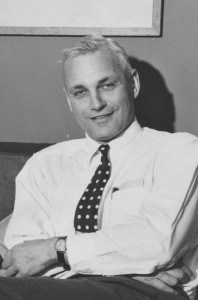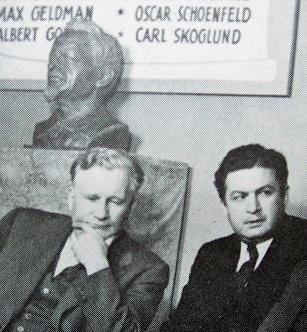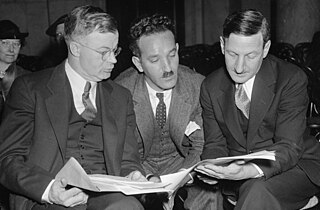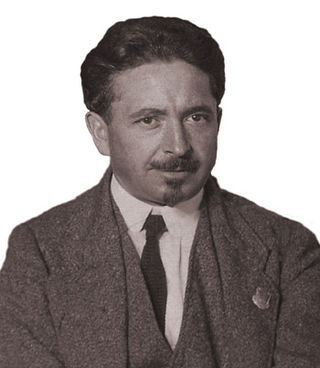Related Research Articles

Gus Hall was the General Secretary of the Communist Party USA (CPUSA) and a perennial candidate for president of the United States. He was the Communist Party nominee in the 1972, 1976, 1980, and 1984 presidential elections. As a labor leader, Hall was closely associated with the so-called "Little Steel" Strike of 1937, an effort to unionize the nation's smaller, regional steel manufacturers. During the Second Red Scare, Hall was indicted under the Smith Act and was sentenced to eight years in prison. After his release, Hall led the CPUSA for over 40 years, often taking an orthodox Marxist–Leninist stance.

Paul Marlor Sweezy was a Marxist economist, political activist, publisher, and founding editor of the long-running magazine Monthly Review. He is best remembered for his contributions to economic theory as one of the leading Marxian economists of the second half of the 20th century.

Earl Russell Browder was an American politician, spy for the Soviet Union, communist activist and leader of the Communist Party USA (CPUSA). Browder was the General Secretary of the CPUSA during the 1930s and first half of the 1940s. During World War I, Browder served time in federal prison as a conscientious objector to conscription and the war. Upon his release, Browder became an active member of the American Communist movement, soon working as an organizer on behalf of the Communist International and its Red International of Labor Unions in China and the Pacific region.

The Proletarian Party of America (PPA) was a small communist political party in the United States, originating in 1920 and terminated in 1971. Originally an offshoot of the Communist Party of America, the group maintained an independent existence for over five decades. It is best remembered for carrying forward Charles H. Kerr & Co., the oldest publisher of Marxist books in America.
Jerome Dwight Davis, was an American activist for international peace and social reform, a labor organizer, and a sociologist who founded the organization Promoting Enduring Peace. Early in his life, he campaigned to reduce the workweek and as an advocate of organized labor.

Felix Morrow was an American communist political activist and newspaper editor. In later years, Morrow left the world of politics to become a book publisher. He is best remembered as a factional leader of the American Trotskyist movement.

Nathan Witt, born Nathan Wittowsky, was an American lawyer who is best known as being the Secretary of the National Labor Relations Board (NLRB) from 1937 to 1940. He resigned from the NLRB after his communist political beliefs were exposed, and he was accused of manipulating the Board's policies to favor his own political leanings. He was also investigated several times in the late 1940s and 1950s for being a spy for the Soviet Union in the 1930s. No evidence of espionage was ever found.
Philip Sheldon Foner was an American labor historian and teacher. Foner was a prolific author and editor of more than 100 books. He is considered a pioneer in his extensive works on the role of radicals, Black Americans, and women in American labor and political history, which were generally neglected in mainstream academia at the time. A Marxist thinker, he influenced more than a generation of scholars, inspiring some of the work published by younger academics from the 1970s on. In 1941, Foner became a public figure as one among 26 persons fired from teaching and staff positions at City College of New York for political views, following an investigation of communist influence in education by a state legislative committee, known as the Rapp-Coudert Committee.

Horace Chandler Davis was an American-Canadian mathematician, writer, educator, and left-wing political activist. The socialist magazine Jacobin described Davis as "an internationally esteemed mathematician, a minor science fiction writer of note, and among the most celebrated political prisoners in the United States during the years of the high Cold War."

Louis Francis Budenz was an American activist and writer. He began as a labor activist and became a member of the Communist Party USA. In 1945, Budenz renounced Communism and became a vocal anti-Communist, appearing as an expert witness at governmental hearings and writing about his experiences.
The Ware Group was a covert organization of Communist Party USA operatives within the United States government in the 1930s, run first by Harold Ware (1889–1935) and then by Whittaker Chambers (1901–1961) after Ware's accidental death on August 13, 1935.

James W. “Jim” Ford was an activist, a politician, and the vice-presidential candidate for the Communist Party USA in the years 1932, 1936, and 1940. Ford was born in Alabama and later worked as a party organizer for the CPUSA in New York City. He was also the first African American to run on a U.S. presidential ticket (1932) in the 20th century.
Granville Hicks was an American Marxist and, later, anti-Marxist novelist, literary critic, educator, and editor.

Max Bedacht Sr. was a German-born American revolutionary socialist political activist, journalist, and functionary who helped establish the Communist Party of America. Bedacht is best remembered as the long-time head of the International Workers Order, a Communist Party-sponsored fraternal benefit organization.
The Fieldites were a small leftist sect that split from the Communist League of America in 1934 and known officially as the Organization Committee for a Revolutionary Workers Party and then the League for a Revolutionary Workers Party. The name comes from the name of its leader B. J. Field.
Alexander "Alex" Bittelman (1890–1982) was a Russian-born Jewish-American communist political activist, Marxist theorist, influential theoretician of the Communist Party USA and writer. A founding member, Bittelman is best remembered as the chief factional lieutenant of William Z. Foster and as a longtime editor of The Communist, its monthly magazine.

James S. "Jim" Allen, born Sol Auerbach (1906–1986), was an American Marxist historian, journalist, editor, activist, and functionary of the Communist Party USA. Allen is best remembered as the author and editor of over two dozen books and pamphlets and as one of the party's leading experts on African-American history.

Jack Hardy, born Dale Zysman, was a 20th-Century Communist author labor leader as "Jack Hardy" and a teacher and board member of the New York City Teachers Union under his birth name "Dale Zysman": investigation by the New York Board of Education led to public awareness that the two names belonged to one person and subsequent expulsion from the school system in 1941.
Howard Selsam was an American Marxist philosopher.
Dorothy Markey, known by the pen name Myra Page, was a 20th-century American communist writer, journalist, union activist, and teacher.
References
- ↑ Leach, Josiah Granville; Penrose, George Hoffman (1903). History of the Penrose Family of Philadelphia. private circulation. pp. 79–. Retrieved 19 May 2017.
- ↑ "Horace B. Davis". Chicago Tribune . July 3, 1999. Archived from the original on 2019-12-24. Retrieved 19 May 2017.
- ↑ King, J. E. (2012-01-01). The Elgar Companion to Post Keynesian Economics. Edward Elgar Publishing. pp. 571–. ISBN 9781781002438 . Retrieved 19 May 2017.
- ↑ Bold, Christine (2006). Writers, Plumbers, and Anarchists: The WPA Writers' Project in Massachusetts. Univ of Massachusetts Press. pp. 91–. ISBN 9781558495395 . Retrieved 19 May 2017.
- 1 2 "Horace B(ancroft) Davis." Contemporary Authors Online, Gale, 2001. Literature Resource Center, http://go.galegroup.com/ps/i.do?p=LitRC&sw=w&u=maine_orono&v=2.1&id=GALE%7CH1000023636&it=r&asid=3f854f8365888e5cffcde15575b8bbe7. Accessed 18 May 2017.
- ↑ Share1163 Hedges, Chris. "The Origin of America's Intellectual Vacuum" Archived 2010-11-20 at the Wayback Machine Truth-Out.org November 15, 2010"It wasn't a cinch I would be in the Communist Party, but in fact I was, starting in 1943 and then resigning soon after on instructions from the party because I was in the military service. This was part of the coexistence of the Communist Party with Roosevelt and the military. It would not disrupt things during the war. When I got out of the Navy I rejoined the Communist Party, but that lapsed in June of 1953. I never got back in touch with them. At the time I was subpoenaed I was technically an ex-Communist, but I did not feel I had left the movement and in some sense I never did."